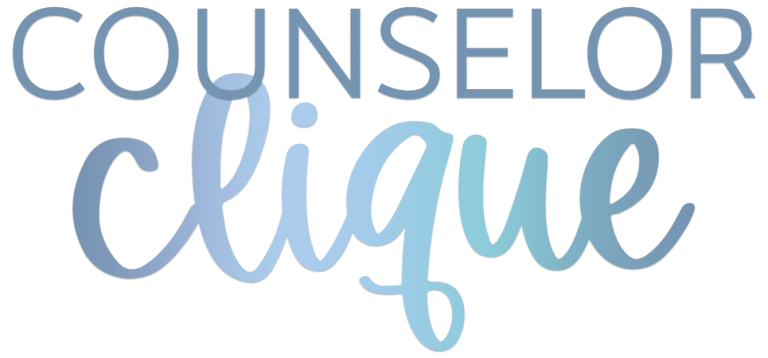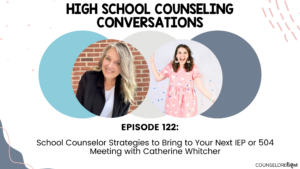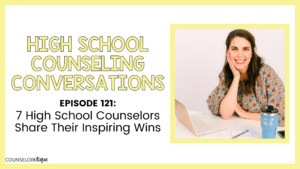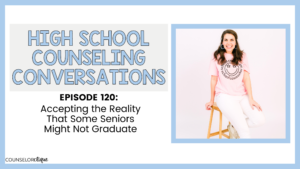During my years as a high school counselor, I discovered a few groups of high school students that I especially needed to make note of, pay attention to, and reach out to. In a large school, sometimes these students could get overlooked or not know what services were available in the school counseling office or through their school counselors.
Let’s face it. Your job as a high school counselor is a juggling act as you try to manage caring for all of the many groups of your high school students. You have the students who come to see you on their own when they need help. You’ve got students who you have to chase down to offer them help.
We really started to notice these students’ needs were not being met when we included students on our advisory council. These students were representative of different groups from our school and really helped us hone in on some of our services for these groups especially.
Here are 5 groups of high school students to look out for and some examples of school counseling services you could provide for them! Talk about meaningful work!

1- First Generation Students
This has always been one of my favorite groups of students to work with on my caseload. I still remember a student coming to me on one of the first days of her senior year when she was new to my caseload to introduce herself and tell me she’d be the first in her family to go to college and that she’d be needing some help. My heart exploded at the self-advocacy, determination, humility, and maturity that she was already showing!
During my formal, one-on-one registration meetings with students, I always bring up “first generation” and have them answer a survey question for me. I love being able to identify these students early in their high school career to be able to boost them and help them along the way while they’re making important decisions in high school.
Whether they’re a high achieving student, an average student, or someone who is just struggling to make it to graduation, knowing that a student could be a first generation graduate from high school or a first generation college-going student can be a game changer for a student’s motivation or your relational capital with them.
For a struggling student, I leverage this information to keep them moving forward, putting one foot in front of the other to prove to themselves and to others that they can do hard things. What a huge accomplishment it is to be the first in your family to graduate high school or go to college! I know that students’ family will be proud of them, and they will be proud of themselves if they can make it to the finish line.
For an average or a high achieving student, there are lots of opportunities in higher education to help level the playing field for these students if they want to attend college. Keep your eyes open for special scholarship opportunities and student fly-in programs for first gen students. There are so, so many! I love being able to provide students with this information that they would never have found on their own because they didn’t even know these programs existed!
For your highest achieving first generation and low-income students (this population does NOT always go hand in hand), be sure to check out Quest Bridge and point them towards an opportunity to apply for their junior summer program or their college match program during senior year. Telling a student about this early on in their high school career can set their sights on goals that can really drive their success in high school!
One of my favorite ways to work with first generation students at my school is to run a First Generation High School Counseling Small Group! There is so much benefit from getting students in a room together with a common bond like being first generation and college-bound. This small group is extremely equipping to the students and refreshing to me as a high school counselor. I have seen so much student growth and empowerment as a result of this small group!
2- Students Wanting to Attend HBCUs
Students often have limited exposure to Historically Black Colleges and Universities (or HBCUs) throughout their K-12 career. As a high school counselor, we have a responsibility and an opportunity to present students with all options for their higher education! If they don’t have family or community influence teaching them about the possibilities of attending an HBCU, then that is even more weight on your shoulders to educate them about what is available.
When students know that you care about their background and their preferences as they seek higher education, they are going to continue coming to you for help. What a humble place to be!
Bring up HBCUs! Talk about them! Expose students to these schools and start conversations about them. Can you arrange a college tour that brings your high school students to HBCU campuses? When you’re planning college tours, be mindful about including HBCUs as a part of your trip or tour. Help connect students to alumni of an HBCU they’re interested in.
Bring HBCU admissions counselors to your high school campus. Point out HBCUs at college fairs. Consider hosting a college fair just for HBCUs or a parent information night about HBCUs. Tell students about the Common Black College Application as a way to apply to multiple HBCUs at one time like the Common App.
There are so many ways to get information to your students about HBCUs, but you need to actively pursue your students (as with all of these niche groups) to put the resources in their hands. If students are missing out on HBCUs, they’re missing a lot of potential value that could be had in their higher education!
3- High School Student-Athletes
There seems to be so much potential for mistakes or a lot of liability around properly advising student athletes. I’d tell you to learn the basics and defer student athletes to their coaches and the athletic director. I have sat with students and families and done research with them about certain rules, regulations, and protocols around recruitment and athletics, but I let the pros handle these for the most part.
I do believe my role in helping student-athletes comes in advocating for them and pushing them to achieve their dreams! I can help keep them on track academically and help drive them in the right direction towards graduation and applying for college if that is their plan. I have sat in meeting with students with their coaches to help ask the right questions, and I also follow up with students after I know they’ve gone on visits to schools. I’ve sat with students as they’ve filled out their NCAA Eligibility profile, and I routinely sent transcripts through the NCAA Portal.
Just like any other student, I help student-athletes think of questions to ask when they visit campus and encourage conversations with admissions counselors. I try to start conversations early if I think a student has expressed interest in playing sports in college because there’s a lot riding on classes and grades each step of the way in high school. Students have to have a plan from the beginning of high school to stay on track if their dream is becoming a college student-athlete! There are a lot of small tasks that go into helpings student-athletes!
4- Low-Income High School Students
It’s important to take note of the gaps in your school data especially if it has to do with low income students! There are a lot of resources out there to help these students! If they never know about the resources, however, then they are not doing much good!
Get some systems in place to provide students with some of the common things you’re helping them with.
Keep a list handy (but private) of your free and reduced lunch students. If you can access this quickly, you can always help in a heartbeat with someone needs something! Free and reduced lunch students can earn waivers for SAT/ACT testing and college applications. There are many scholarship opportunities and money available through the FAFSA for your highest need students.
I have found it helpful to start talking about this with students EARLY ON in their high school careers. It doesn’t do much good when a student finds out about these services after they’ve already applied to college. Bring in community organizations who want to help mentor or provide services to students as a part of what they’re already doing. Start an awareness of the resources for your students so they don’t miss out on valuable opportunities.
Put practices in place to avoid summer melt. If students don’t feel equipped or prepared to make the transition to college on their own, they might not make the transition to get registered and show up for their classes. If you can make connections for students with college advisors or people on their future college campus before they leave your high school campus, they’re much more likely to follow through with showing up in the fall after a long summer.
5- DACA or Undocumented High School Students
Of course, you will not know who all of your undocumented students are.
Stay knowledgeable about changing policies and advocate for your students. This can come naturally to us to want to protect and advocate… but it takes more work to stay up-to-date on changing policies in our state and nation. It can be tricky and complicated, but it is important to our students… so it should be important to us as high school counselors.
Check in with your students. They may be scared or anxious about their status or their rights and implications that these have on their future or higher education. Seek out opportunities to connect with these students yourself and connect them with other safe and valuable community resources.
Every student’s needs are different, but you can be a welcoming space to think and process through those needs and stressors. Remind them that your services are confidential and you are on their team! Your trustworthiness will be a huge motivation for your students who know you are a safe place to turn to.
There are many more groups of high school students to look out for on your caseload and in your school building. These ideas can get you started on advocating for some niche groups and developing programs and system to best serve their needs.
Interested in some college podcasts to learn more about serving these niche groups of students as they potentially move on towards higher education? Check out my College Resources Podcast Roundup by downloading it for free when you join my email list!






